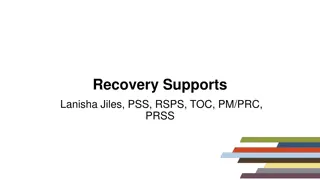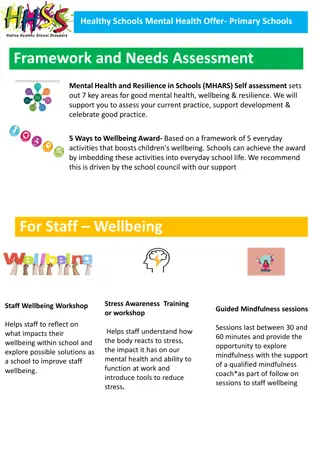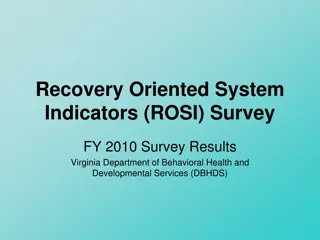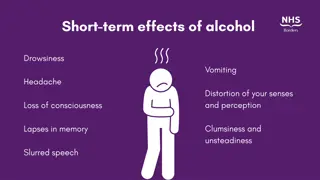National Framework for Recovery-Oriented Mental Health Services
This content discusses the importance of strengths-based approaches in mental health care, highlighting the value of recognizing individuals' strengths and supporting personal recovery. It emphasizes conveying belief in personal capacity and using natural supports to inform assessments and treatment plans.
Download Presentation

Please find below an Image/Link to download the presentation.
The content on the website is provided AS IS for your information and personal use only. It may not be sold, licensed, or shared on other websites without obtaining consent from the author.If you encounter any issues during the download, it is possible that the publisher has removed the file from their server.
You are allowed to download the files provided on this website for personal or commercial use, subject to the condition that they are used lawfully. All files are the property of their respective owners.
The content on the website is provided AS IS for your information and personal use only. It may not be sold, licensed, or shared on other websites without obtaining consent from the author.
E N D
Presentation Transcript
Exploring Karen Ditty Senior Clinician NWAMHS Shared Care
A NATIONAL FRAMEWORK FOR RECOVERY-ORIENTED MENTAL HEALTH SERVICES: GUIDE FOR PRACTITIONERS AND PROVIDERS Capability 3B: Focusing on strengths and personal responsibility updated 2013 Recovery-oriented mental health care focuses on people s strengths and supports resilience and capacity for personal responsibility, self-advocacy and positive change. http://www.health.gov.au/internet/publications/publishing.nsf/Content/mental-pubs-n- recovgde-toc~mental-pubs-n-recovgde-app~mental-pubs-n-recovgde-app-3~mental- pubs-n-recovgde-app-3-b
Characteristics Values and attitudes Mental health practitioners and providers... convey their belief in people s capacity to reach their aspirations and to shape a life rich in possibility and meaning acknowledge and positively reinforce people s strengths and capacity for personal recovery reflect a strengths focus in attitude, language and actions
Assessing the strengths of mental health consumers: A systematic review University of Wollongong Faculty of Business 6:2012 Within the guidance relating specifically to how services can support personally defined recovery , adopting a strengths focus and using a person s natural supports were key sub-themes ( A conceptual framework for personal recovery in mental health: systematic review and narrative synthesis. Le Boutillier, Leamy, Bird, Davidson, Williams & Slade, 2011). In practice, this means assessing and using knowledge of a person's strengths and natural supports to inform assessments, care plans and goals, and to actively use the identified strengths within a person's care and treatment.
How do you do this in your practice? What is a strengths based approach? What is the purpose of values & goals in a strengths-based approach? (SAW & CASIG) How do you help clients identify them now using this framework?
What is a value? Oxford Dictionary: The regard that something is held to deserve ; the importance, worth, or usefulness of something. Qualities, characteristics or ideas about which we feel strongly really important to us Values affect (& are reflected in) our decisions, goals and behaviour Values = standards that guide action, judgments, & attitudes. Define what is of worth, what is beneficial, and what is safe/harmful to us
THINK: You have been given a check for $1000.00 to do whatever you like with it. What would you do with it? ??? What you spend the money on has everything to do with what you value Values = what you feel is important & are reflected in behaviour/actions/time
Direction: Values Goals Behaviour = Self-Value Values give direction & consistency to behaviours. help us make choices (to do or not do). establish a relationship between self & the world/others. set the direction for one s life as we start out inform our actions throughout our lives
Types of Values: Moral Material Aesthetic Intrinsic Extrinsic Universal/Ethnicity Group Specific Values
Age/Stage & Values Different people & life experiences influence & impact on values: Ages 0-7 yrs --- parents Ages 8-13 yrs --- teachers, heroes (sports, hobbies/ interests/games, TV/media) Ages 14-20 yrs--- peers (values because of peers or peers because of values?) Ages 21 yrs+ --- values are established but often change over time. Values are contextual.
Values in Context Culture Employment/Employers Societal influences current & past (70 s anti-establish- ment, peace, individuality. 80 s money, prestige, don t get caught, etc. 90 s earth, green peace, health & fitness. 00 s Gen Y/ Why , the internet. Now Gen Z virtual lives/ communities, Google generation, etc.) Families Childhood experiences School/education Friends/Peer interests TV/Media Faith/Spirituality Music/Books Hobbies/Interests
ACTIVITY TIME! Exploring Your Values & Goal Setting booklet purpose Dare to Connect Orientation - usefulness Values activity The Life Compass p.5 (p.6) Complete the work sheet. NB: Not to share or compare answers!....but notice the emotions & thoughts that come up as you re undertaking the task.
Values versus Beliefs versus Goals: Values reflect personal beliefs Belief: an acceptance that something exists or is true, especially one without proof (Oxford Dictionary) Something one accepts as true or real; a firmly held opinion Should s , ought , are supposed to , have to , must , etc. Strong/foundational influences in our choices, behaviour and lives. Goals = objectives something that you are trying to achieve The object of a person s ambition or effort; an aim or desired result. The destination of a journey (Oxford Dictionary) Goals are established by observation and measurement An accomplishment informed by personal values & beliefs S.M.A.R.T.Y. (later)
When your values When your values become clear to you, become clear to you, Making decisions become Making decisions become easier. easier.
MoreACTIVITY TIME! Revisit The Life Compass p.5 (p.6) Choose an area where you d like to be more in line with your values through your actions. If clarity about values is needed: Value Cards/Lists 5 Why s exercise S.M.A.R.T.Y. & other goal worksheets (if time)
Conceptualization(Russ Harris ACTtraining slide 1) 1. What direction does the client want to take their life in? (What s most important to them?) 2. What s stopping them? a) What are they fused with? b) What are they avoiding? c) What ineffective actions are they taking? 16
Values-based goals involves commitment, returning again and again to movement in a valued direction.
MoreACTIVITY TIME! Other handouts (avoidance, values, mindfulness, crisis & relapse planning, problem-solving & tips on motivating) Values Card Sort & St Luke s Strength Cards Sticker Sheet Life Trix / Matrix (Kevin Polk youtube training videos) Optimism Boosters , It s Good to Be Me , What I like about Me card sets Websites & resources www.youtube.com/watch?v=VYht-guymF4 ( Unwelcome Party Guest ACT Metaphor) www.contextualpsychology.org (useful resources/tx protocols, research, etc.) www.actmindfully.com.au www.happinesstrap.com
Questions??? & Evaluations























